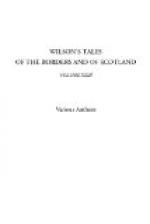An example of the conditional syllogism which might have amused even a writer to the signet, if he had not been at the very moment busy in the examination of the handwriting of the funeral letter and that of the paper of repudiation and malison—the resemblance, or rather the identity of which was so striking, as to reduce all his theories to confusion.
“By all that’s good in heaven, the same,” he muttered to himself; and then addressing his visitor, “I confess, Mrs. Hislop,” said he, “that this paper has driven me somewhat off my point of confidence; but I suppose you will see that, if the child was actually, as the letter indicates, buried with its mother, Henrietta’s rights are at an end. It is just possible, however, I fairly admit, that Mr. Napier, who was a very eccentric man, may have so worded the letter as to induce the world to believe that the so-considered illegitimate child had been dead-born, while he gratified—privately he might verily think—his vengeance by writing this terrible curse. Still I think you are wrong; but as this wonderful paper gives you a plausible plea, I would recommend you to Mr. White, in Mill’s Court, who will see to the young woman’s rights. He will be the flint, and I the steel; and between our friendly opposition we will produce a spark which will light up the candle of truth.”
“Ay,” replied she; “only as the spark of fire comes from the steel, we’ll just suppose you are the flint—and by my troth you’re hard enough; but, come as it may, it will light the lantern that will show Henney Napier to the bonnie haughs of Eastleys.”
Mrs. Hislop having got back her paper from Mr. Dallas, left the writer’s chambers, and directed her steps to Mill’s Court, where she found Mr. White, even as she had Mr. Dallas, busy poring over law papers. She was, as we have seen, one of those people who can make their own introduction acceptable, and, moreover, one of those women, few as they are, who can tell a story with the continuity and fitting emphasis necessary to secure the attention of a busy listener. So Mr. White heard her narrative, not only with interest, but even a touch of the pervading sympathy of the spirit of romance. And so he might; for who doesn’t see that the charm of mystery can be enhanced by the hope of turning it to account of money? Then he was so much of a practical man as to know that while every string has two ends, the true way to get hold of both is to make sure in the first place of one. Wherefore he began to interrogate his client as to who could speak to the doings in the house in Meggat’s Land on that eventful night when the child was born; and having taken notes of the answers to his questions, he paused a little, as if to consider what was the first step he ought to take into the region of doubt, and perhaps of intrigue, where at least there must be lies floating about like films in the clear atmosphere of truth. Nor had he meditated many minutes till he rose, and taking up his square hat and his gold-headed cane, he said—




